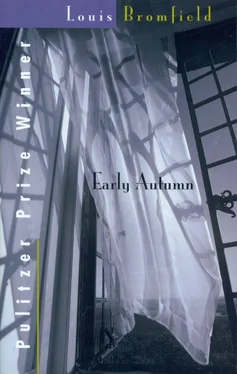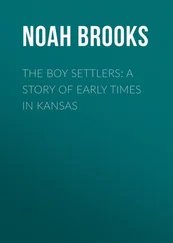A light came into the eyes of Olivia. “No; we mustn’t,” she repeated, and then, “She’s a clever girl. … She knows what she wants from life, and that’s the whole secret. Most people never know until it’s too late.”
A silence followed this speech, so eloquent, so full of unsaid things, that Olivia grew uneasy.
“I wanted to talk to you about …” he hesitated for a moment, and she saw that beneath the edge of the table his hands were clenched so violently that the bony knuckles showed through the brown skin. “I wanted to talk to you about a great many things.” He stirred and added abruptly, “First of all, there’s my will.”
He opened the desk and took out a packet of papers, separating them carefully into little piles before he spoke again. There was a weariness in all his movements. “I’ve made some changes,” he said, “changes that you ought to know about … and there are one or two other things.” He looked at her from under the fierce, shaggy eyebrows. “You see, I haven’t long to live. I’ve no reason to expect to live forever and I want to leave things in perfect order, as they have always been.”
To Olivia, sitting in silence, the conversation became suddenly painful. With each word she felt a wall rising about her, shutting her in, while the old man went on and on with an agonizing calmness, with an air of being certain that his will would be obeyed in death as it had always been in life.
“To begin with, you will all be left very rich … very rich … something over six million dollars. And it’s solid money, Olivia … money not made by gambling, but money that’s been saved and multiplied by careful living. For seventy-five years it’s been the tradition of the family to live on the income of its income. We’ve managed to do it somehow, and in the end we’re rich … very rich.”
As he talked he kept fingering the papers nervously, placing them in neat little piles, arranging and rearranging them.
“And, as you know, Olivia, the money has been kept in a way so that the principal could never be spent. Sybil’s grandchildren will be able to touch some of it … that is, if you are unwise enough to leave it to them that way.”
Olivia looked up suddenly. “But why me? What have I to do with it?”
“That’s what I’m coming to, Olivia dear. … It’s because I’m leaving control of the whole fortune to you.”
Suddenly, fiercely, she wanted none of it. She had a quick, passionate desire to seize all the neatly piled papers and burn them, to tear them into small bits and fling them out of the window.
“I don’t want it!” she said. “Why should you leave it to me? I’m rich myself. I don’t want it! I’m not a Pentland. … It’s not my money. I’ve nothing to do with it.” In spite of herself, there was a note of passionate resentment in her voice.
The shaggy brows raised faintly in a look of surprise.
“To whom, if not to you?” he asked.
After a moment, she said, “Why, Anson … to Anson, I suppose.”
“You don’t really think that?”
“It’s his money … Pentland money … not mine. I’ve all the money I need and more.”
“It’s yours, Olivia. …” He looked at her sharply. “You’re more a Pentland than Anson, in spite of blood … in spite of name. You’re more a Pentland than any of them. It’s your money by every right in spite of anything you can do.”
(“But Anson isn’t a Pentland, nor you either,” thought Olivia.)
“It’s you who are dependable, who are careful, who are honorable, Olivia. You’re the strong one. When I die, you’ll be the head of the family. … Surely, you know that … already.”
(I,” thought Olivia, “I who have been so giddy, who am planning to betray you all. … I am all this!”)
“If I left it to Anson, it would be wasted, lost on foolish ideas. He’s no idea of business. … There’s a screw loose in Anson. … He’s a crank. He’d be giving away this good money to missionaries and queer committees … societies for meddling in the affairs of people. That wasn’t what this fortune was made for. No, I won’t have Pentland money squandered like that. …”
“And I,” asked Olivia. “How do you know what I will do with it?”
He smiled softly, affectionately. “I know what you’ll do with it, because I know you, Olivia, my dear. … You’ll keep it safe and intact. … You’re the Pentland of the family. You weren’t when you came here, but you are now. I mean that you belong to the grand tradition of Pentlands … the old ones who hang out there in the hall. You’re the only one left … for Sybil is too young. She’s only a child … yet.”
Olivia was silent, but beneath the silence there ran a torrent of cold, rebellious thoughts. Being a Pentland, then, was not a matter of blood: it was an idea, even an ideal. She thought fiercely, “I’m not a Pentland. I’m alive. I am myself. I’ve not been absorbed into nothing. All these years haven’t changed me so much. They haven’t made me into a Pentland.” But for the sake of her affection, she could say none of these things. She only said, “How do you know what I’ll do with it? How do you know that I mightn’t squander it extravagantly—or—or even run away, taking all that was free with me. No one could stop me—no one.”
He only repeated what he had said before, saying it more slowly this time, as if to impress her. “I know what you’ll do with it, Olivia, because I know you, Olivia dear—you’d never do anything foolish or shameful—I know that—that’s why I trust you.”
And when she did not answer him, he asked, “You will accept it, won’t you, Olivia? You’ll have the help of a good lawyer … one of the best … John Mannering. It will please me, Olivia, and it will let the world know what I think of you, what you have been to me all these years … all that Anson has never been … nor my own sister, Cassie.” He leaned across the table, touching her white hand gently. “You will, Olivia?”
It was impossible to refuse, impossible even to protest any further, impossible to say that in this very moment she wanted only to run away, to escape, to leave them all forever, now that Sybil was safe. Looking away, she said in a low voice, “Yes.”
It was impossible to desert him now … an old, tired man. The bond between them was too strong; it had existed for too long, since that first day she had come to Pentlands as Anson’s bride and known that it was the father and not the son whom she respected. In a way, he had imposed upon her something of his own rugged, patriarchal strength. It seemed to her that she had been caught when she meant most to escape; and she was frightened, too, by the echoing thought that perhaps she had become, after all, a Pentland … hard, cautious, unadventurous and a little bitter, one for whom there was no fire or glamour in life, one who worshiped a harsh, changeable, invisible goddess called Duty. She kept thinking of Sabine’s bitter remark about “the lower middle-class virtues of the Pentlands” … the lack of fire, the lack of splendor, of gallantry. And yet this fierce old man was gallant, in an odd fashion. … Even Sabine knew that.
He was talking again. “It’s not only money that’s been left to you. … There’s Sybil, who’s still too young to be let free. …”
“No,” said Olivia with a quiet stubbornness, “she’s not too young. She’s to do as she pleases. I’ve tried to make her wiser than I was at her age … perhaps wiser than I’ve ever been … even now.”
“Perhaps you’re right, my dear. You have been so many times … and things aren’t the same as they were in my day … certainly not with young girls.”
He took up the papers again, fussing over them in a curious, nervous way, very unlike his usual firm, unrelenting manner. She had a flash of insight which told her that he was behaving thus because he wanted to avoid looking at her. She hated confidences and she was afraid now that he was about to tell her things she preferred never to hear. She hated confidences and yet she seemed to be a person who attracted them always.
Читать дальше












